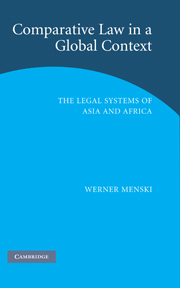Book contents
- Frontmatter
- Contents
- Preface and acknowledgments
- Table of cases
- Table of statutes
- List of abbreviations
- PART I Comparative framework
- Introduction: Globalisation and Asian and African legal systems
- 1 Comparative law and legal theory from a global perspective
- 2 Legal pluralism
- 3 Comparative jurisprudence: images and reflections of law
- PART II Regional comparisons in a global context
- Conclusion: towards global legal realism
- References
- Index
Introduction: Globalisation and Asian and African legal systems
Published online by Cambridge University Press: 09 November 2009
- Frontmatter
- Contents
- Preface and acknowledgments
- Table of cases
- Table of statutes
- List of abbreviations
- PART I Comparative framework
- Introduction: Globalisation and Asian and African legal systems
- 1 Comparative law and legal theory from a global perspective
- 2 Legal pluralism
- 3 Comparative jurisprudence: images and reflections of law
- PART II Regional comparisons in a global context
- Conclusion: towards global legal realism
- References
- Index
Summary
In the late twentieth century, globalisation seems to have become ‘the cliché of our times’ (Held et al., 1999: 1). Linked to postmodernism, it has given rise to a large body of writing in many academic subjects. While postmodernism remains heavily contested as a concept and methodology, it seems that globalisation as a widely observable fact is not seriously challenged as a phenomenon. However, scholars argue vigorously about its consequences, and many debates focus on the role of the nation state in newly conceived contexts of global interconnectedness. There is as yet little discussion about how globalisation relates to legal theory and understandings of law. In common parlance, the term creates assumptions about the desirability of increased efficiency in processes of global communication. We immediately think of easier travel, homogenisation of trade laws and harmonisation or integration of all kinds of rules, easing communication processes by recourse to one language, one pattern of doing business, and so on. This is matched by the tempting assumption that there would be less conflict if only all humans thought alike, followed uniform moral standards and respected universal human rights.
However, is this realistic in view of universal plurality? Much universalised thinking about globalisation goes too far in its uncritical acceptance of the advantages of uniformisation. It is rather unreal to expect that the whole world would ever follow one rule system, one language and culture, or one law.
- Type
- Chapter
- Information
- Comparative Law in a Global ContextThe Legal Systems of Asia and Africa, pp. 3 - 24Publisher: Cambridge University PressPrint publication year: 2006

